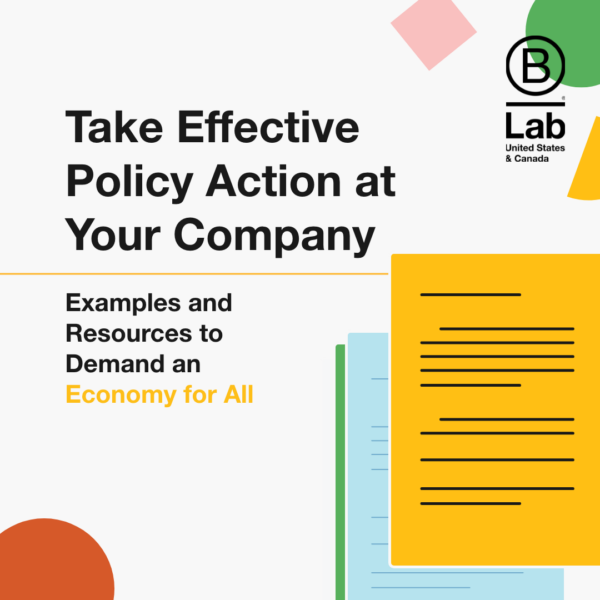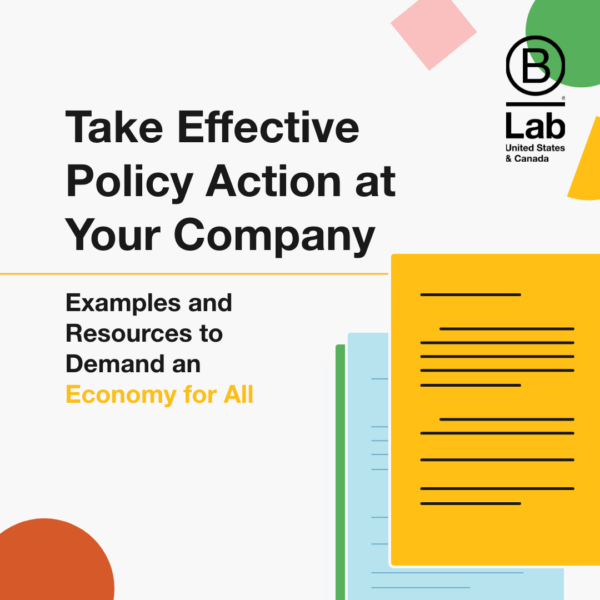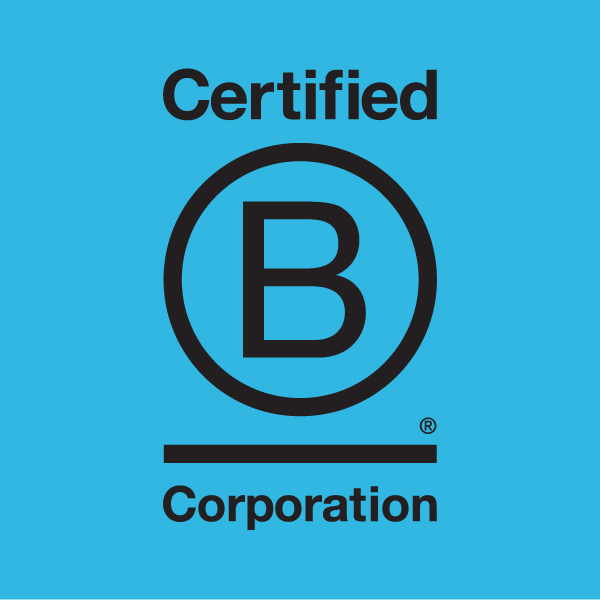Take Effective Policy Action at Your Company: Examples and Resources to Demand an Economy for All
October 12, 2022
How Businesses Can Advocate for a More Resilient and Inclusive Economy
In the midst of global challenges — a pandemic, racial inequality, and economic instability — that affect all communities, business leaders face a choice as they look to the future. Do we want business as usual, or should we instead seize the opportunity to rebuild and collaborate to create an inclusive and regenerative economy that better serves all people?
By operating with legal standards that commit to serving all stakeholders, Certified B Corporations demonstrate how businesses can create both a profit and benefit for people and the planet. But more of this is necessary to address long-standing issues, including a widening racial wealth gap and the accelerating negative effects of climate change. To change the outcomes, it’s time to change the rules that govern business decision-making.
That’s where benefit corporation governance can make a difference. By requiring companies to be accountable to investors as well as stakeholders, benefit corporation governance broadens businesses’ focus beyond profit to also include people and the planet.
A new free downloadable resource shares how B Lab U.S. & Canada and the B Corp community are building a stakeholder economy and driving collective political action to make the rules of the game more equitable and beneficial for all. These real-world resources and examples are from companies engaged in advocacy work, from customer education to collective action campaigns. Get a preview of a few below, then use that inspiration to take action!

Examples and Resources to Demand an Economy for All
Download the free resource for more on these and other policy-focused articles to help businesses create a more inclusive and resilient economy.
Best Practices and Tools to Measure and Advocate for a Stakeholder Economy
The first section of the resource includes articles highlighting how companies are incorporating stakeholders into their everyday operations and what it means to do business as a B Corp. Here’s a preview:
- Stakeholder economy and governance around the world: Companies that adopt benefit governance are required to consider their impact on all stakeholders — including workers, communities, suppliers, customers, and the environment — alongside shareholders and profits when making decisions and setting company policies. More than 40 U.S. states plus Puerto Rico and Washington, D.C., now have benefit corporation laws on the books, highlighting bipartisan agreement on ways businesses can operate with a broader lens. Globally, there are officially more than 50 benefit governance laws, including in France, Colombia, and British Columbia, Canada. These laws are all voluntary, meaning businesses can opt in. B Lab and the more than 5,000 B Corps around the world are taking collective action to require stakeholder governance to meet the urgency of the global challenges we need to solve.
- Four tools to advance work with purpose: In the U.S. and Canada, B Corps are shaping positive change by advancing climate justice, racial equity, and a stakeholder-driven economy — the three pillars of B Lab U.S. & Canada’s Theory of Change. Resources from B Lab and its partners offer resources to help shape that work. The four highlighted here are the Climate Justice Playbook for Business; the Board Playbook for the journey to become a benefit corporation; The 2021 CEO Blueprint for Racial Equity; and The Future of Work Is Now on stakeholder engagement.
- Two complementary tools that help companies measure and report their impact on stakeholders: Two resources that help companies measure their impact — the GRI Standards (GRI) and B Lab’s B Impact Assessment — provide a holistic approach to sustainability reporting and impact management. Companies that have completed a GRI-compliant sustainability report can use that content to help complete the B Impact Assessment, and those that have completed the B Impact Assessment can use some answers to inform the content of a GRI report. B Lab and GRI share how companies and other stakeholders can better understand the connections between GRI and the B Impact Assessment and how to use them together efficiently.
Examples of Policy Advocacy on Issues
In the second section, the focus shifts to everyday examples of business practices and policies that can help build a more inclusive and regenerative economy. Here’s a peek at a few examples:
- Systems change through business-led policy advocacy: To encourage more business leaders to find and use their voice for positive systems change, B Lab U.S. & Canada hosted the policy discussion Business for Good: Speaking Up For Systems Change, during the Shift 2022 Virtual Impact Summit. Get highlights of the conversation featuring Lauren Paul, Director of Partnerships and Policy at Common Future, an Oakland, California-based community leadership organization; Kate Ogden, Advocacy and Movement Building Manager at Seventh Generation, a Vermont-based B Corp; and Raj Aggarwal, President and Lead Strategist at Provoc, a B Corp and strategic marketing and communications firm.
- How companies can support the LGBTQIA community all year: Nicole Hunter of B Corp Mightybytes explores ways to move beyond Pridewashing to create authentic policies and communications that support LGBTQIA equality beyond Pride Month. These include suggestions for individual and organizational actions, communications, and financial support that help create a more inclusive workplace and economy.
- How the financial industry is working to close the racial wealth gap: This LinkedIn Live conversation features B Corps and other purpose-driven financial organizations working to shift capital to People of Color and other communities that traditionally have been underserved by banks and other financial institutions. Find highlights of the discussion featuring Darrin L. Williams, CEO of Southern Bancorp, a B Corp that also is a Community Development Financial Institution; Rodney Williams, Co-Founder and President of SoLo Funds, a new B Corp and financial technology company for underserved communities; and Morgan Simon, Founding Partner of Candide Group, an Oakland-based registered investment advisor.

Examples and Resources to Demand an Economy for All
Download the free resource for more on these and other policy-focused articles to help businesses create a more inclusive and resilient economy.
-

-

-

Business Strategy
How the Financial Industry Is Working to Close the Racial Wealth Gap: Tapping the Power of Community and Collaboration
Read More -

Sign Up for our B The Change Newsletter
Read stories on the B Corp Movement and people using business as a force for good. The B The Change Newsletter is sent weekly.
